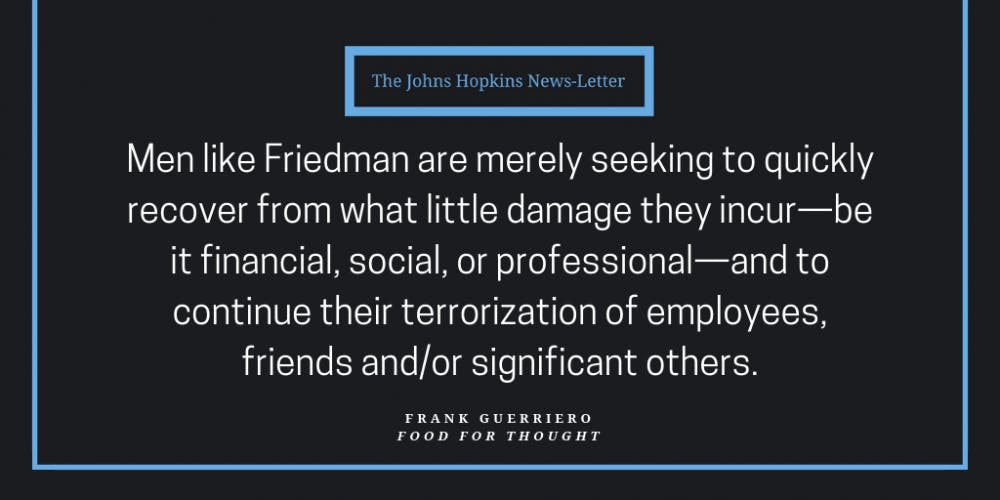
As we approach the one year anniversary of the bombshell reports on Harvey Weinstein’s decades-long reign of sexual terror over Hollywood and the global explosion of the #MeToo movement, the press and social media are burgeoning with questions of redemption.
Over the summer, Aziz Ansari and Louis C.K. decided it was time for their comebacks at Manhattan’s Comedy Cellar, and just a few blocks over at the Michelin-starred restaurant The Spotted Pig, Ken Friedman—the high-powered restaurateur accused of cultivating and contributing to a violently sexualized workplace environment—seemed to secure a path forward, as well.
Hardly a week after the gifted chef behind his group’s many restaurants, April Bloomfield, officially severed ties with the businessman, Friedman secured the talents of James Beard Award–winning chef Gabrielle Hamilton and her wife and co-chef, Ashley Merriman, to take Bloomfield’s place.
Amidst a whirlwind of social media backlash and industry-wide disappointment in the prominent queer chefs’ decision to partner with one of the Weinsteins of the food world, Hamilton and Merriman justified the move in increasingly bizarre and offensive ways, to the bewilderment and outrage of chefs, restaurateurs and diners across the food world.
This all changed last week, when Hamilton and Merriman announced that the partnership had ended before either of them ever commanded the kitchen. The chefs said that in the final stages of reorganizing the bustling Manhattan restaurant, they and Friedman could not agree on a structure that placed Hamilton and Merriman in charge of day-to-day operations.
By recruiting two of the most talented and prominent queer female chefs in America to run his kitchens, and then refusing to cede significant control to them, Ken Friedman reminded us of what we already knew about abusers, especially abusive restaurant owners. That is, these men will not voluntarily give up their positions of power—they can only be forced out.
Friedman is a master manipulator, known around the restaurant world for retaliating against and blacklisting employees that challenge his abusive practices. According to reports, he built a culture at The Spotted Pig that was not merely salacious and occasionally uncomfortable—it was violent and dangerous.
In the months following the initial accusations, the New York Police Department opened a criminal investigation of Mario Batali, an investor and frequent guest who Spotted Pig employees nicknamed “the Red Menace” for his predatory antics. Batali and other industry figures behaved so reprehensibly during late-night parties at the restaurant that some servers came to call the third floor private space where they gathered “the Rape Room.”
Friedman crafted this air of fear and abuse because he could—he thrived off of the sense of power it gave him to make people fearful in their workplace. In that way, his sexual predation was the ugliest and most dangerous component of the web of toxicity he spun at The Spotted Pig.
It therefore makes perfect sense that Friedman wouldn’t want to give up control of a fraction of his power, especially to a pair of powerful queer women. He is not interested in a post–#MeToo Spotted Pig if he no longer has space to manipulate and abuse his employees.
There’s also an issue with how the conversation around this whole saga, in that Friedman’s voice has been largely absent. I’m not arguing that he should be allowed some opportunity to excuse his actions, but instead that he hasn’t been forced to answer for his part in this ethical fiasco—and of course, his part is the largest—as Hamilton and Merriman have. Frankly, it’s plainly misogynistic to assign more than a tiny fraction of the blame to Hamilton and Merriman in this situation while allowing Friedman to skate by.
To plaster their photo at the top of an article on the partnership or to remind readers of Hamilton’s ill-advised metaphors in detail, instead of recounting some of the dozens of verified instances of often violent sexual harassment by Friedman, is virtually to place these individuals on an equal plane of blame. Although Hamilton and Merriman are not completely innocent, it’s important to remember, and to remind one another, that Friedman should be the principal object of our ire.
Ultimately, Ken Friedman has proven that abusers don’t truly seek redemption. Redemption involves active atonement, not just apologies, and requires that perpetrators humbly remove themselves from environments they poisoned rather than deepen their devastating effects. Then they must truly learn from their mistakes and work to repair some of the suffering they caused.
Instead, men like Friedman are merely seeking to quickly recover from what little damage they incur—be it financial, social, or professional—and to continue their terrorization of employees, friends and/or significant others. It’s imperative that everyone in the restaurant world, from diners to executive chefs, makes that as difficult for them as possible.





